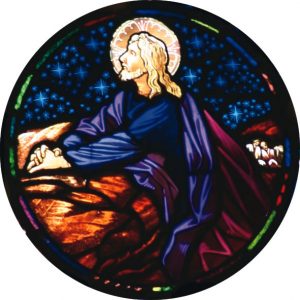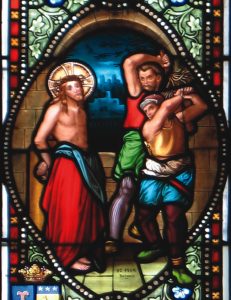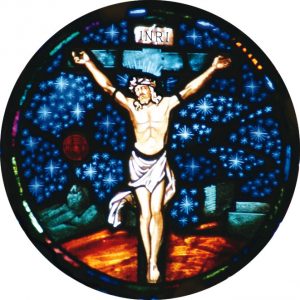The Gospel of Matthew – Part 7
This is the final installment of Joe McHugh’s series.The chapters covered are featured in the liturgy of Holy Week.
The chief priests and elders decide to put Jesus to death, but they caution one another, “Not during the festival, or there may be a riot among the people.” But Jesus’ death will occur during the Passover festival for two reasons. On the divine level, Jesus has just prophesied it, “You know that after two days the Passover is coming, and the Son of Man will be handed over to be crucified.” On the human level, Judas’ offer to betray Jesus is too good an opportunity to pass up, even during the festival.
Matthew pays more attention to Judas than do the other evangelists. Shocked by Jesus’ announcement that one of the disciples will betray him, the others ask, “Surely not I, Lord?” “Lord” is a true disciple’s title for Jesus. But Judas asks, “Surely not I, Rabbi?” Rabbi is a simple honorific title. Judas no longer thinks of Jesus as Lord. At the arrest in Gethsemane, Judas will say “Greetings, Rabbi!” and kiss Jesus.
During the supper Jesus establishes the Eucharist “for the forgiveness of sins.” After the supper, Jesus and the disciples (except Judas) go to Gethsemane. There Jesus first prays, “My Father, if it is possible, let this cup pass from me; yet not what I want but what you want.” In his humanity Jesus fears death. But then Jesus resigns himself and prays instead, “My Father, if this cannot pass unless I drink it, your will be done.” Jesus conforms his will to the Father’s. At the arrest Jesus orders a sword-wielding disciple: “Put your sword back into its place; for all who take the sword will perish by the sword. Do you think that I cannot appeal to my Father, and he will at once send me more than twelve legions of angels?” We must remember that Jesus was free to say “No” to his being arrested. If he asked the Father to send twelve legions of angels (72,000), the Father would have done so. “But how then would the scriptures be fulfilled, which say it must happen in this way?”
Jesus is taken away to the house of Caiaphas, the high priest. There the chief priests and elders decide that Jesus must be put to death. While Jesus is facing his trial, Peter, out in the courtyard, fails his. As Jesus had predicted, Peter denies Jesus three times. When the cock crowed as Jesus had foretold, Peter went out and wept bitterly.
The chief priests had paid Judas Iscariot thirty pieces of silver to betray Jesus. This was not an enormous amount. The scriptural background is Exodus 21:32: “If the ox gores a male or female slave, the owner shall pay to the slaveowner thirty shekels of silver.” Jesus’ value is considered of a slave. Yet, on hearing Jesus condemned, Judas flings the money into the Temple saying, “I have sinned by betraying innocent blood.” Judas went out and hanged himself. We may speculate about Judas: why did he betray Jesus, what moved him to repent, what was in his mind when he committed suicide? Matthew doesn’t explain, and so we don’t know. We must leave Judas’ fate up to God.
Remember how God communicated with Joseph and with the Magi in the earliest chapters of this Gospel? A message is sent to the Roman governor Pilate by his wife, “Have nothing to do with that innocent man, for today I have suffered a great deal because of a dream about him.” Pilate was not strong enough in character to release the innocent Jesus. He tried a ploy, asking the crowd which of two prisoners he should release to them, “Jesus Barabbas or Jesus who is called the Messiah?” (Some ancient manuscripts omit Barabbas’ first name. But this is likely a decision of a scribe copying the manuscript, out of reverence for the Lord.) Ironically, Pilate offers a choice between two Jesuses and two “sons of the father,” for that is what Barabbas means. The crowd demands the release of the criminal and the crucifixion of the innocent.
Matthew 27:25 has troubled many: “Then the people as a whole answered, ‘His blood be on us and on our children!’” Matthew intended to charge the religious leaders with leading the people to destruction. “On our children” is a limitation to a single generation, the generation that would endure the Romans’ destruction of Jerusalem in the year 70. Vatican Council II’s “Declaration on the Relationship of the Church to Non-Christian Religions,” (Latin title: Nostra Aetate), No. 4, reads: “.…the Church believes that by his cross Christ, our Peace, reconciled Jews and Gentiles, making both one in himself….True, the Jewish authorities and those who followed their lead pressed for the death of Christ; still, what happened in his passion cannot be charged against all the Jews, without distinction, then alive, nor against the Jews of today….”
Matthew closely follows Mark’s outline of the crucifixion. The Roman soldiers force a Libyan named Simon to carry Jesus’ cross. (This Simon acted like a disciple when Simon Peter did not.) On the cross, Jesus prays once more to the Father in the opening words of Psalm 22, “My God, my God, why have you forsaken me?” Matthew adds to Mark’s account that at the death of Jesus not only was the temple veil rent in two but also there was an earthquake, the splitting of rocks and the opening of tombs. These are signs that in Jesus’ death the beginning of the final age has arrived. The Roman soldiers recognize Jesus as God’s Son.
In 27:62-66 and 28:11-16, Matthew is writing as an apologist. In the 80’s of the first century, Jews who did not believe in Jesus were still repeating the story started by the chief priests about the disciples stealing Jesus’ body. “This story is still told among the Jews to this day” refers to Matthew’s own day. None of my Jewish neighbors has ever suggested this to me.
Back in 1:23 Matthew told us, “they shall name him Emmanuel, which means, ‘God is with us.’” After his resurrection, Jesus calls together his disciples in Galilee and commissions them to make disciples of all nations. The risen Emmanuel assures his disciples, “And remember, I am with you always, to the end of the age.”.
Tagged as: Barabbas. crucifixion, Gethsemane, Judas
Comments are closed.


 Entries(RSS)
Entries(RSS)